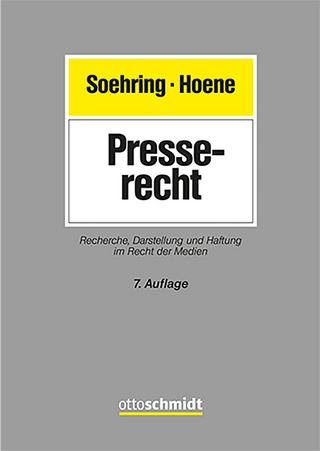
Modern Sports Law
A Textbook
Seiten
2010
Hart Publishing (Verlag)
978-1-84113-685-1 (ISBN)
Hart Publishing (Verlag)
978-1-84113-685-1 (ISBN)
Aimed primarily at students this books offers an account of how the law influences the operation, administration and playing of modern sports.
The aim of this book is to provide an account of how the law influences the operation, administration and playing of modern sports. Although the book focuses on legal doctrine it has been written bearing in mind sport's historical, cultural, social and economic context, including the drama and colour of sport's major events and leading personalities. And although it is inevitably very much concerned with elite professional sports it is not dominated by them, and seeks to cover the widest possible range of sports, professional and amateur. Initially, the book addresses practical issues such as the structures of national and international sport, and examines the evolution of the body of law known as 'sports law'. Thereafter three main themes are identified: regulatory; participatory; and, financial aspects of modern sport. The regulatory theme is dealt with in chapters considering the manner in which decisions of sports governing bodies may be challenged in the ordinary courts and the development of alternative dispute resolution mechanisms in sport.
The participatory theme includes the legal regulation of doping and violence in sport, as well as the broader topic of tortious liability for sporting injuries. The financial theme, reflecting the enhanced commercialisation of sport at all levels, is developed in chapters concerning issues in applied contract and employment law for players and legal matters surrounding the organisation of major sports events. The conclusion summarises modern sport's experience of EU law, pointing the way to the future direction of sports law more generally. While the book is aimed primarily at students, and is designed to cover fundamental and topical areas of sports law (sports law in general; sports bodies and the courts; arbitration in sport; corruption; doping; violence; civil liability; discrimination; the commodification of modern sport; and, the likely future of sports law), it should also prove of wider interest to practitioners, sports administrators and governing bodies; and though focused primarily on UK law it will also appeal to readers in Australia, Canada, New Zealand and the USA.
The aim of this book is to provide an account of how the law influences the operation, administration and playing of modern sports. Although the book focuses on legal doctrine it has been written bearing in mind sport's historical, cultural, social and economic context, including the drama and colour of sport's major events and leading personalities. And although it is inevitably very much concerned with elite professional sports it is not dominated by them, and seeks to cover the widest possible range of sports, professional and amateur. Initially, the book addresses practical issues such as the structures of national and international sport, and examines the evolution of the body of law known as 'sports law'. Thereafter three main themes are identified: regulatory; participatory; and, financial aspects of modern sport. The regulatory theme is dealt with in chapters considering the manner in which decisions of sports governing bodies may be challenged in the ordinary courts and the development of alternative dispute resolution mechanisms in sport.
The participatory theme includes the legal regulation of doping and violence in sport, as well as the broader topic of tortious liability for sporting injuries. The financial theme, reflecting the enhanced commercialisation of sport at all levels, is developed in chapters concerning issues in applied contract and employment law for players and legal matters surrounding the organisation of major sports events. The conclusion summarises modern sport's experience of EU law, pointing the way to the future direction of sports law more generally. While the book is aimed primarily at students, and is designed to cover fundamental and topical areas of sports law (sports law in general; sports bodies and the courts; arbitration in sport; corruption; doping; violence; civil liability; discrimination; the commodification of modern sport; and, the likely future of sports law), it should also prove of wider interest to practitioners, sports administrators and governing bodies; and though focused primarily on UK law it will also appeal to readers in Australia, Canada, New Zealand and the USA.
Jack Anderson is a lecturer in law at Queen's University, Belfast.
1. Introduction: What is Sports Law? 2. Challenging Decisions of Sports Governing Bodies 3. Arbitration and Alternative Dispute Resolution in Sport 4. The Legal Regulation of Drugs in Sport 5. Criminal Violence in Sport 6. Civil Liability in Sport 7. Sports-Related Contracts of Employment 8. Conclusion: Brussels or Boston? The Future of Sports Law
| Verlagsort | Oxford |
|---|---|
| Sprache | englisch |
| Maße | 156 x 234 mm |
| Gewicht | 568 g |
| Themenwelt | Recht / Steuern ► EU / Internationales Recht |
| Recht / Steuern ► Privatrecht / Bürgerliches Recht ► Medienrecht | |
| ISBN-10 | 1-84113-685-9 / 1841136859 |
| ISBN-13 | 978-1-84113-685-1 / 9781841136851 |
| Zustand | Neuware |
| Haben Sie eine Frage zum Produkt? |
Mehr entdecken
aus dem Bereich
aus dem Bereich
Recherche, Darstellung und Haftung im Recht der Medien
Buch | Hardcover (2024)
Verlag Dr. Otto Schmidt KG
CHF 179,95
Lehrbuch des gesamten Medienrechts unter besonderer Berücksichtigung …
Buch | Softcover (2023)
UTB (Verlag)
CHF 30,80


